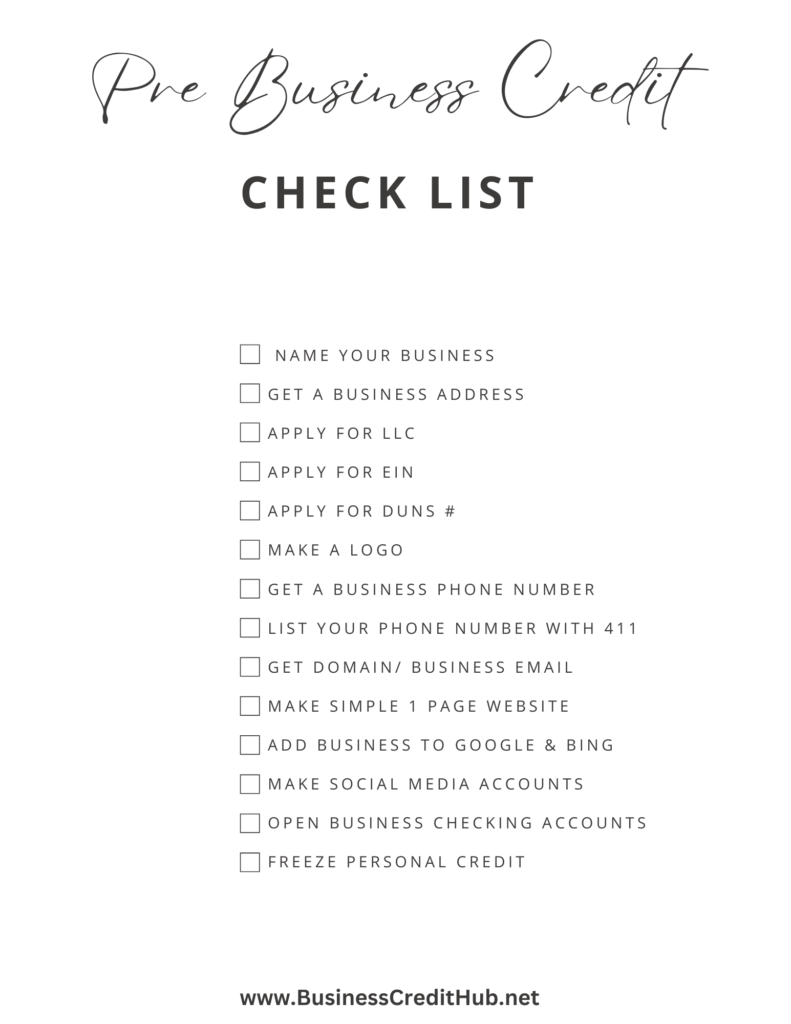“Step-by-step checklist to starting a business with a focus on building strong business credit— a checklist for successful financial foundations.”

Pre-Business Credit Checklist: Essential Steps for Entrepreneurs
Introduction
Starting a business is an exhilarating journey filled with potential, but laying a solid foundation is critical before you embark on building business credit. Establishing business credit can open doors to financing options, better terms with suppliers, and overall credibility. This checklist outlines essential steps that every entrepreneur should take to prepare for this crucial aspect of business ownership.
1. Name Your Business
Choosing the right name for your business is more than just a creative endeavor; it’s your first step toward establishing a unique identity in the marketplace. A well-thought-out name should reflect your business’s mission and values while resonating with your target audience.
1.1 Importance of a Strong Name
A strong name can be a powerful marketing tool. It should be catchy, easy to remember, and indicative of what you offer. Your business name sets the tone for your brand, influencing how customers perceive your company.
1.2 Researching Name Availability
Before you get too attached to a name, conduct thorough research to ensure it isn’t already in use. Check with the U.S. Patent and Trademark Office to avoid potential legal issues, and consider searching online to see if other businesses in your industry have similar names.
2. Get a Business Address
A professional business address is crucial for establishing legitimacy and gaining customer trust. It serves as your business’s physical location and is essential for communication and official documentation.
2.1 Benefits of a Separate Business Address
Having a dedicated business address provides several benefits, including enhanced professionalism and the ability to keep your personal and business correspondence separate. This is particularly important if you work from home.
2.2 Options for Business Addresses
You can choose from various options, such as virtual offices, co-working spaces, or renting a physical location. Evaluate what fits best with your business model and budget.
3. Apply for an LLC
Forming a Limited Liability Company (LLC) is one of the most important steps you can take to protect your personal assets and establish your business as a separate legal entity.
3.1 Advantages of an LLC
LLCs offer numerous advantages, including limited liability protection and potential tax benefits. This structure helps shield your personal assets from business debts and liabilities, providing peace of mind as you grow.
3.2 How to Form an LLC
To form an LLC, you’ll need to file articles of organization with your state and pay a registration fee. The requirements vary by state, so it’s important to research local laws.
4. Apply for an EIN
An Employer Identification Number (EIN) is essential for tax purposes and helps you open business accounts.
4.1 Importance of an EIN
An EIN functions like a Social Security number for your business. It separates your business finances from personal ones, making it easier to manage your financial records and file taxes.
4.2 How to Obtain an EIN
You can apply for an EIN for free through the IRS website. The process is straightforward and usually takes just a few minutes.
5. Apply for a DUNS Number
A DUNS number is crucial for establishing your business credit profile and is often required for government contracts and grants.
5.1 What is a DUNS Number?
A DUNS number is a unique identifier for businesses, provided by Dun & Bradstreet. It helps lenders and suppliers assess your business’s creditworthiness.
5.2 Obtaining a DUNS Number
To apply for a DUNS number, visit the Dun & Bradstreet website. The application process is free and typically takes a few business days.
6. Make a Logo
Creating a professional logo is a vital step in establishing your brand’s visual identity. A well-designed logo makes your business easily recognizable and memorable.
6.1 Importance of Branding
A strong logo conveys professionalism and can help differentiate your business from competitors. It’s an essential part of your marketing strategy.
6.2 Tools for Designing a Logo
Consider using design tools like Canva, Adobe Illustrator, or hiring a freelance graphic designer. Ensure that your logo aligns with your brand’s values and appeals to your target audience.
7. Get a Business Phone Number
Having a dedicated business phone number is essential for maintaining professionalism and facilitating customer communication.
7.1 Benefits of a Separate Phone Line
A separate business phone line allows you to keep work and personal calls distinct, helping you maintain a healthy work-life balance. It also adds a layer of professionalism when dealing with customers.
7.2 Options for Business Phone Services
You can choose between VoIP services, such as RingCentral or Google Voice, or traditional phone lines. Evaluate your communication needs to select the best option for your business.
8. List Your Phone Number with 411 Directory Assistance
Getting your business phone number listed in directory assistance enhances your visibility and trustworthiness in the eyes of potential customers.
8.1 Why Listing is Important
A listing can help customers find you easily when searching for local services, thus increasing your reach.
8.2 How to List Your Number
Contact your local directory assistance provider to inquire about the process for listing your business phone number.
9. Get a Domain Name, Hosting, and Business Email Address
A professional online presence is crucial in today’s digital world. Your domain name, website hosting, and business email are the cornerstones of your online identity.
9.1 Importance of a Domain Name
Your domain name is your business’s online address. Choose a name that is short, memorable, and aligns with your brand.
9.2 Setting Up Hosting and Email
Select a reliable hosting provider, such as Bluehost or SiteGround. You can also set up a business email through your hosting provider, reinforcing your brand’s professionalism.
10. Make a Simple 1-Page Website
Even a basic website can enhance your credibility and serve as a central hub for information about your business.
10.1 Why a Website is Necessary
A website provides essential details about your products or services, hours of operation, and contact information, making it easier for potential customers to find and connect with you.
10.2 Tools for Building a Website
Consider user-friendly platforms like WordPress, Wix, or Squarespace, which offer templates and easy-to-use features for beginners.
11. Add Your Business to Google and Bing
Claiming your business on search engines improves your online visibility and accessibility to potential customers.
11.1 Benefits of Listing on Search Engines
A listing allows your business to appear in local searches, enhancing your chances of attracting customers.
11.2 Step-by-Step Listing Guide
Create a Google My Business account and a Bing Places listing. Follow the prompts to input your business information accurately.
12. Make Business Social Media Accounts
Creating social media profiles is vital for engaging with customers and building a community around your brand.
12.1 Importance of Social Media
Social media platforms provide opportunities for marketing, customer engagement, and brand building. They allow you to reach a wider audience and foster relationships with customers.
12.2 Platforms to Consider
Identify which platforms are most relevant to your business. Facebook, Instagram, and LinkedIn are popular choices depending on your target audience.
13. Open a Business Checking Account
Separating your personal and business finances is crucial for accurate bookkeeping and financial management.
13.1 Benefits of a Business Account
A dedicated business checking account simplifies tax filing, helps track expenses, and builds your business credit.
13.2 Choosing the Right Bank
Consider factors such as fees, services offered, and convenience when selecting a bank that fits your business needs.
14. Freeze Your Personal Credit
Protecting your personal credit is vital as you embark on your business journey. Freezing your credit can prevent identity theft and safeguard your personal finances.
14.1 Why You Should Freeze Your Credit
A credit freeze restricts access to your credit report, making it harder for identity thieves to open accounts in your name. This added layer of protection is especially important for entrepreneurs.
14.2 How to Freeze Your Credit
Contact each of the major credit bureaus—Experian, TransUnion, and Equifax—to freeze your credit. This process is usually straightforward and can often be done online.
Conclusion
By following this pre-business credit checklist, entrepreneurs can establish a solid foundation for building business credit. These steps not only enhance your credibility but also prepare you for future financial opportunities. As you embark on your entrepreneurial journey, remember that laying a strong groundwork is essential for long-term success.
FAQ Section
What is business credit, and why is it important?
Business credit refers to the creditworthiness of a business. It is important because it can affect your ability to secure financing, obtain favorable terms from suppliers, and build credibility with customers.
How long does it take to establish business credit?
Establishing business credit can take several months to a few years, depending on the actions you take to build your credit profile and the types of credit accounts you secure.
Can I use my personal credit to finance my business?
While it is possible to use personal credit for business purposes, separating your personal and business finances is crucial for protecting your assets and building business credit.
What are the consequences of not establishing business credit?
Not establishing business credit can limit your financing options, hinder your ability to negotiate favorable terms with suppliers, and make it difficult to scale your business effectively.




